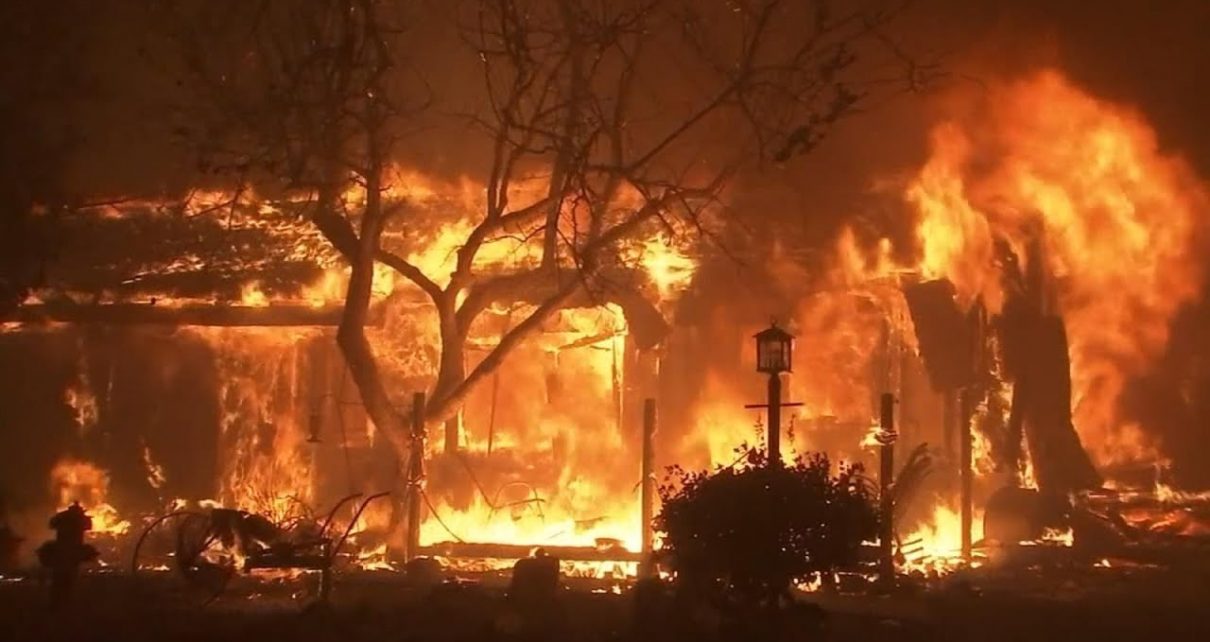
California Wildfires. (Photo: youtube)
Utility Chiefs Grilled by California Senators Over Power Shut Downs
Described as another legislative ‘dog and pony show’
By Katy Grimes, November 19, 2019 6:45 am
The CEO’s and COO’s of the California’s largest utilities came together Monday in a hearing by the California Senate Energy and Utilities Committee over the shutting off of power for millions of people in an attempt to prevent wildfires during typical California high winds.
The hearing was described by several people attending as a dog and pony show.
Missing from most of the questioning by Senators was the responsibility and accountability of the California Public utilities Commission, which is entirely responsible for the oversight and regulation of California’s utilities.
There was much climate change posturing by Senators, including the opening statement by Committee Chairman Sen. Ben Hueso (D-San Diego), when he said “we see extreme weather affecting our state,” despite that the handout by his own committee called high winds as “typical.”
The Committee fact sheet and timeline said, “California’s electric utilities have sought and been authorized to proactively shutoff power as a tool to reduce igniting wildfires.”
PG&E
The hearing was centered around the testimony of Pacific Gas & Electric Corp. CEO Bill Johnson, but there were no fireworks. Johnson testified Monday explaining how and why the utility company left millions of people without power for 5 to 12 days at a time during the state’s usual fall dry, windy weather in October.
He enumerated the $30 billion invested in updating, and beefing up electric transmission lines over the last 10 years. Johnson said PG&E has spent $2 billion back into the electricity system including inspecting 730,000 miles of transmission lines, and 25 million components.
Johnson said the utility company just crammed 18 months worth of inspections into four months.
But he noted, extremely high winds can still cause tree limbs to fall on lines and break them.
He also noted that PG&E’s website crashed, and their communications system went down in October, acknowledging that they fell quite short. Since then they’ve greatly improved their communications systems, Johnson said.
Several Senators intimated it was time to rethink the future of the state’s largest electrical utility.
McGuire pressed Johnson about PG&E’s bankruptcy, and whether he is open to all options – “a public option, a regional option.”
“I’m open to any response that is best for the people of Northern California,” Johnson said. “I think PG&E as an independent company is best for the people.”
Sen. Mike McGuire (D-Sonoma) acknowledged that Bill Johnson had only been with PG&E since April. “You inherited a hot mess sir,” McGuire said. He said PG&E is by far the largest of the utilities, and covers much more territory.
Sen. Bill Dodd (D-Napa) told Johnson that an Oct. 9 shutoff was “a big ‘screw you’ to your customers. That has really created among the Legislature and among your customers a real trust issue,” Dodd said. “It leaves everyone wondering what’s next.”
Johnson, and then his chief engineer Sumeet Singh explained that they were following protocol. Singh said 730,000 customer accounts were effected October 9, “as we looked at transmission lines shutoffs.” Singh said they also did restoration quickly, saying they’ve gone from 51 hours of restoration to 12 hours.
“This company, in my mind, has forfeited its right to operate as an investor-owned utility,” said Sen. Scott Wiener (D-San Francisco). “We need fundamental structural change at PG&E because the status quo just isn’t working and hasn’t worked for a long time.”
SDG&E
The testimony of Caroline Winn, Chief Operating Officer for San Diego Gas and Electric, made clear that SDG&E was the poster child for infrastructure investment, maintenance and anticipating future needs.
Winn said SDG&E engineers figured out how to cut off power to broken lines even before the line can hit the ground, “beating gravity.” She said they sharpened their emergency management capabilities.
Winn said the SDG&E’s power outages have averaged approximately 24 hours, largely because the company has upgraded its equipment to more narrowly tailor shutoffs in specified sections of their grid.
SCE
Phil Herrington, Senior Vice President of Transmission and Distribution for Southern California Edison was also grilled by the Senate committee.
Facts
PG&E is a regulated utility, as is SCE and SCD&G. Their rates are not randomly established, but done through a laborious and very public process.
CalFire handles fire suppression and fire prevention in much of PG&Es territory. CalFire, regulators, and PG&E all are responsible.
The Governor put out his own statement about the hearing late Monday:
Today, members of the Newsom administration testified before the Senate and told how state government – when faced with extreme Public Safety Power Shutoffs (PSPS) by PG&E in October – flew into action to protect residents and communities.
“Faced with the unprecedented decision by PG&E to leave millions of Californians without power, the State of California sprung into action to protect vulnerable residents,” said Governor Gavin Newsom. “In this time of crisis, Californians joined together to help identify and assist those who would be most at risk during long periods without power. California agencies partnered with local leaders, non-profits, labor unions and private industry to deploy resources to communities most in need. Our world-class emergency responders and emergency agencies battled on multiple fronts – dangerous fire conditions and PSPS. Through prepositioning of firefighting assets and mobilizing emergency response systems, California was able to avoid the major loss of life that has occurred under similar conditions.”
Next, Part ll: State Oversight
- Could President Trump End the Income Tax? - February 26, 2026
- Trump State of the Union: Democrats Showed They’re Not On the Side of The American People - February 25, 2026
- Leaving California: Public Storage Relocates HQ from California to Texas - February 25, 2026





These legislators should probably go back to acting class before putting on another self-righteous and phony theatrical production. It’s embarrassing, when we know that their actual goal is the state takeover of utilities, using PG&E as the scapegoat. Given what Katy Grimes told us earlier about the obstacles in their path, it’s probably not a realistic goal, but I guess they can’t help themselves. As bad as PG&E has been, a state takeover would be a nightmare you couldn’t wake up from.
Mighty Mouse Newsom pats himself on the back because his leadership saved the day. Theatrical just like Aunt Nancy.